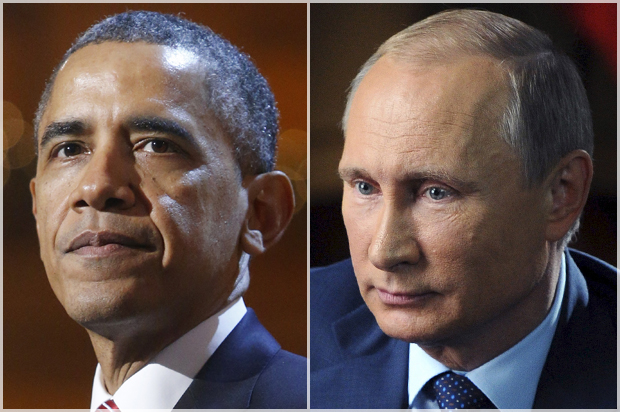President Obama’s sanctions against Russia in the wake of hacking allegations are a transparent political ploy that would be more meaningful if he’d spent his presidency standing up to Russian aggression on everything from Crimea to Syria and Israel.
They would also be more meaningful if President Obama, who this week orchestrated what’s being called the “biggest retaliation against Russians since the Cold War” if he hadn’t so flippantly dismissed rival Mitt Romney’s prescient analysis of Russian threats. “The 1980s are now calling to ask for their foreign policy back because the Cold War’s been over for 20 years,” President Obama prodded Romney during their 2012 foreign policy debate.
Such snark is also reminiscent of when President Obama called ISIS the “JV team.” And it likely underscored why President Obama in 2009 chose to scrap the George W. Bush administration’s planned deployment of a missile defense system to Poland and the Czech Republic. Then, scrambling, leading from behind in a reactionary posture, President Obama pushed for a new defense system unveiled this year in Romania.
That President Obama would take such an aggressive stance now seems rather faux-hawkish — like he’s playing catch-up, as my Opportunity Lives colleague John Hart suggests. Obama was quick to defend Hillary Clinton, the secretary of state he sent to Moscow with the red Russian “reset button.” That Clinton’s reset button utterly failed harbingered why the American people had little faith that she would succeed if she’d taken her boss’ job.
Foreign meddling is obviously troubling and House Speaker Paul Ryan was correct in saying sanctions against Russia were long overdue. Senate Majority Leader Mitch McConnell called for an inquiry into the attacks, and Sen. Marco Rubio warned in October against gloating or capitalizing off the possible hack. After all, it could be them next; cyberattacks could assault either party. And there’s no evidence that any elected Republican collaborated on this hacking episode.
Yet Democrats’ outrage at Russian electoral meddling would have greater moral weight if there wasn’t a history of Democrats trying to undermine American elections by colluding with the Soviets. Peter Robinson, research fellow at the Hoover Institution at Stanford University and a former White House speechwriter, wrote in Forbes that former Sen. Ted Kennedy sought to conspire with the Soviets in 1984 to oust Ronald Reagan from the White House.
It appears that Democrats are trying to throw doubt on the legitimacy of President-elect Trump’s victory. Clinton campaign chair John Podesta even cast doubt on whether November’s election was free and fair, despite no evidence that voter rolls or voting booths were hacked. And it is difficult to see how the possible Russian hacking caused Clinton to place a homebrew server in her house, a move that, if justice were blind, would have disqualified her from receiving classified briefings.
Russian hackers did not create Clinton’s insular, 30-year career in politics that voters found so distasteful. They did not create Obamacare or double America’s debt or lead President Obama to oversee what The Huffington Post’s Sam Stein recently called “the destruction of the Democratic Party.” Many true, negative things can be said about Putin’s crackdown on free speech and human rights, yet it’s difficult to say that Putin is the cause for Democrats going from 256 House seats, 58 Senate seats and 28 governorships in 2009 to 188 House seats, 46 Senate seats and 18 governorships this year. To paraphrase a 2012 catchphrase, no Vlad, you didn’t build that.
President-elect Trump can take a balanced approach to this situation. As Politico’s Anna Palmer and Jake Sherman wrote, “there’s a way for Trump to say: ‘Russia interfered in our election. It was wrong. They should pay for it. But I still won Michigan, Pennsylvania, Ohio and Wisconsin — and the White House — and that had nothing to do with Vladimir Putin.’”
That Putin has chosen not to reciprocate in response to President Obama’s sanctions could be seen as a sign that he tacitly acknowledges Russian wrongdoing and also both fears and admires Trump. The question now is whether the Trump administration will stand up against Russia for America’s political integrity. After all, Trump won on a platform of America First.


